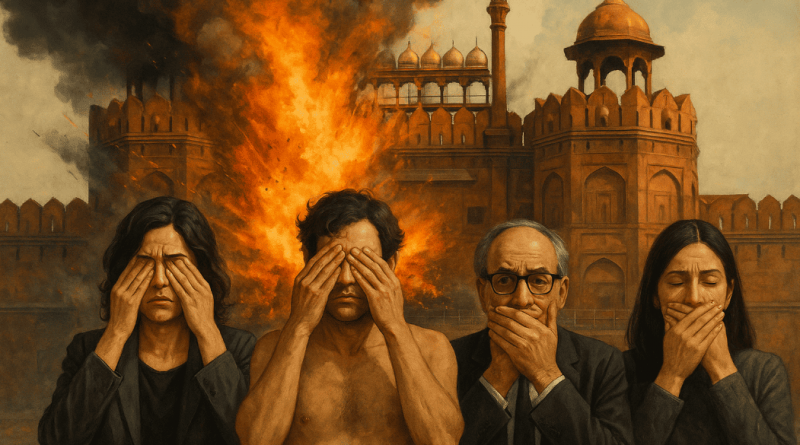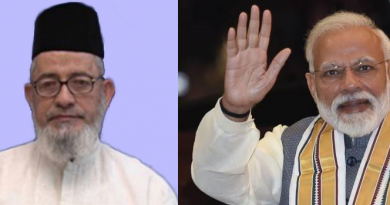A Hypocrisy That Is Dripping: A Critical Perspective on the Delhi Blast
A community that refuses to ask hard questions cannot meaningfully oppose the violence committed in its name.
The Delhi blast has exposed a deep intellectual dishonesty that is rampant in our public discourse. Within minutes of the attack, a cliched line of action and thought emerged: that the attack was meant to “break the nation,” to “polarise,” and therefore must be treated cautiously. But this narrative sidesteps the central truth—that the perpetrator acted in the name of an ideology, a self-declared inspiration that many refuse to confront.
To put the facts straight, the individual now proven to have carried out the attack was a doctor, Umar Nabi — a detail that makes the incident even more unsettling.
It demolishes a comfortable myth long circulated in public: that education, development, economic upliftment, social recognition and what not can automatically neutralise religious and specifically Islamic radicalisation. This narrative has failed repeatedly. Many of the individuals behind major terror attacks across the world have been highly educated, trained in elite institutions, and fully integrated into modern life.
Terrorism i.e killings of civilians for any reason whatsoever, therefore, is not simply the product of deprivation, nor the natural extension of religious identity. It is far more complex. Recognising this complexity is the first step to find a solution.
Recognising this complexity is essential. If we fall back into predictable patterns — one side painting an entire community as suspect, the other denying any internal crisis — we learn nothing.
The attack should force us to confront uncomfortable questions: How do educated individuals embrace violence against fellow human beings? What makes a successful Doctor transform himself into a Human Bomb, what shapes his conviction? What ideological, psychological, or political currents draw them in? What failures — institutional, social, intelligence-related — allowed this to happen? And what safeguards must be built so that it never happens again?
The 10th November 2025 attack in Delhi has cracked public discourse wide open. A large section of the Hindu community has responded with chest-thumping triumphalism, claiming the blast has finally vindicated their suspicions about Muslims. In turn, many Muslims have rushed to defend Islam as inherently peaceful, and sections of the left-liberal commentators have unquestioningly adopted this defensive posture. Amid this noise, the one thing the country urgently needs—honest introspection—is almost entirely missing. Families have lost loved ones. People have died. Yet the national conversation is trapped in accusation and denial instead of truth-seeking.
The identity of the attacker makes the event even more unsettling. Umar Nabi was not an impoverished drifter or an undereducated youth; he was a doctor. His profile obliterates the comforting myth that education, economic mobility, professional success or integration automatically inoculates individuals against radicalisation.
This narrative has been disproved repeatedly. Some of the most destructive terrorists—from Al-Qaeda to ISIS to Indian Mujahideen—have come from elite institutions. Radicalisation is not the child of poverty, it is the child of conviction. That conviction may be ideological, theological, psychological, or political—but it is conviction, not deprivation, that transforms an educated doctor into a human bomb.
This demands serious inquiry. How do educated individuals embrace violent extremism? What shapes their certainty? What ideological ecosystems make violence feel morally justified—or even sacred? What political or communal narratives fertilise such thinking? What institutional failures—intelligence, policing, community engagement—allowed this to unfold? And what safeguards must be built so it never happens again?
The inconsistency is glaring. When a Muslim figure achieves something remarkable—whether Salahuddin Ayyubi in history or Zohran Mamdani in contemporary politics—the global Ummah celebrates it as a victory of Islam. Young men in Kurla proudly claim Zohran’s win as their own. But when violence is committed explicitly in the name of Islam, the same Ummah retreats behind denial. Success is collective; violence is conveniently individualised. This is moral incoherence.
Even if one grants, for argument’s sake, that false-flag operations occur in global geopolitics, a car exploding in the heart of the capital cannot be dismissed as a conspiracy without evidence. Such claims have become an intellectual opium for the left-liberal class terrified of being labelled Islamophobic. Rather than interrogate the ideological motivations behind the blast, they cling to comfortable fantasises.
The situation mirrors October 7. There too, defenders justified mass killings under the language of “resistance,” while blaming Israel’s intelligence for failing to prevent an attack whose ideological basis was plainly declared. The question practically writes itself: if these same intellectuals were told that someone like Umar Nabi planned to massacre civilians at the Red Fort, would they alert the state? Or would they they go gungho over how the Muslims are oppressed.
The claim that “terror has no religion” collapses when perpetrators themselves invoke Quranic verses and Hadith as justification. External commentators have no authority to dismiss the ideological motivations confessed by the attackers. Muslim communities must confront this directly. Calling for introspection is not endorsing the Hindutva narrative; it is demanding moral responsibility from within.
Many Muslims who hesitate to condemn the blast forget that Muslims themselves increasingly become targets of Islamist violence. The attack is not only against innocents; it desecrates the dignity of the religion they claim to honour. If alleged blasphemy by Nupur Sharma could summon tens of thousands into the streets, then the murder of thirteen people in the name of Islam should evoke ten times the outrage. Yet instead, some justify the killings privately or downplay them publicly. This selective morality is hypocrisy of the highest order.
The left-liberal ecosystem reacts predictably: blame intelligence failure, demand resignations, stop the inquiry there. What they refuse to examine is the ideological worldview that produces such massacres. 13 individuals died. Yet the conversation instantly shifts to the fear of Islamophobia—as if hypothetical prejudice outweighs actual corpses lying on Delhi’s streets. This inversion of moral priority is staggering.
Muslims must confront this honestly. Three choices remain: fully accept literalist readings, reinterpret the tradition rigorously, or abandon passages irreconcilable with contemporary ethics. Anything else is intellectual beating around the bush.
A community that refuses to ask hard questions cannot meaningfully oppose the violence committed in its name. At this moment, moral clarity can not be optional—it is the only path forward.
If we retreat into binaries—one side criminalising an entire community, the other denying any internal crisis—we learn nothing. This moment should not deepen fault lines; it should be the beginning of an honest resolution. Only a society capable of honest, uncomfortable introspection—free from vindictiveness on one side and denial on the other—can hope to prevent the next act of violence.
Disclaimer: Views expressed by writers in this section are their own and do not reflect Milli Chronicle’s point-of-view.



